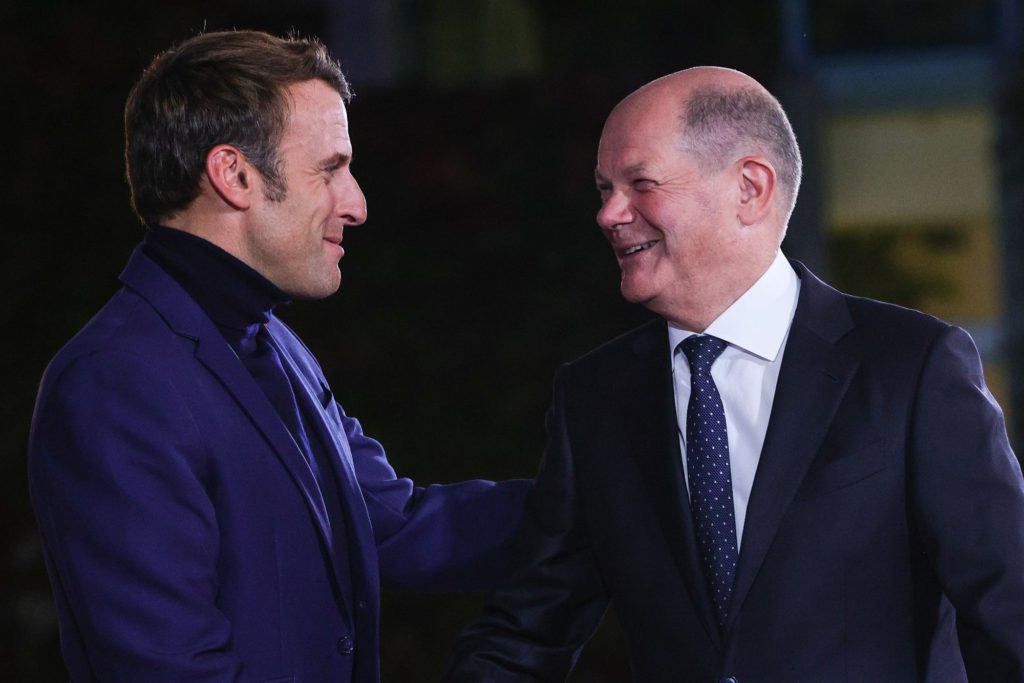German Chancellor Olaf Scholz and French President Emmanuel Macron meet in Paris Wednesday to try and iron out tensions over energy and the future of European defense.
(Bloomberg) — German Chancellor Olaf Scholz and French President Emmanuel Macron meet in Paris Wednesday to try and iron out tensions over energy and the future of European defense.
A Macron aide said the two leaders are set to discuss defense, macroeconomic issues and energy over a working lunch at the presidential palace.
Europe’s two biggest economies have traditionally been the driving force behind key decisions in the European Union including a massive plan to raise billions of euros in joint debt to weather the Covid pandemic.
But the Franco-German engine appears to have jammed up, potentially delaying decision-making just as the EU grapples with acute challenges from the Russia’s war in Ukraine to soaring energy prices.
Paris and Berlin canceled a joint meeting of government ministers that had been scheduled for Wednesday, to replace it with a Scholz visit and the lunch at the Elysee Palace.
The decision came after Berlin agreed to build a missile defense shield dubbed the “European Sky Shield Initiative” with other members of the NATO military alliance, that could include German, US and Israeli-made equipment, dubbed the “European Sky Shield Initiative.”
Ministers Cancel
The project is a blow for France, which has been developing a ground-to-air defense system with Italy known as Mamba.
On the sidelines of a meeting of EU leaders last week, Macron said the joint ministerial gathering had been canceled because German ministers were not available, although he insisted on the significant amount of work ahead for the two partners.
The next meeting, which is mostly symbolic, is planned in January for the 60th anniversary of the Elysee treaty, a treaty of friendship signed between leaders Charles de Gaulle and Konrad Adenauer to end years of Franco-German enmity, and which called for regular meetings between the two.
Independence
The missile shield isn’t the only thorn in the relationship, especially in the defense sector. Like his predecessors, Macron argues that Europe should rely on its own defense systems to be independent of the US.
In Paris, officials have privately warned that President Donald Trump, or a figure with similar doubts on the need for a strong transatlantic relationship, could come back to power. They emphasize the need for stronger EU autonomy in defense.
But France, which has Europe’s biggest and strongest defense industry with giants such as Dassault Aviation or Thales SA, is often suspected of pushing its own economic interests when it promotes “strategic sovereignty.”
SpaceX Cooperation
Officials in Paris have privately complained that Germany is working with the US’s SpaceX to launch satellites rather than relying on the European launcher, Ariane, and that it bought F-25 fighter jets from Lockheed Martin.
Progress is also slow on the Future Combat Air System, known as FCAS. The Franco-German-Spanish project includes a jet fighter meant to replace France’s Rafale and Germany’s Typhoons jets in 2040.
As Berlin readies new legislation on weapons exports, a group of two dozen anonymous French defense experts dubbed Vauban published a column in newspaper La Tribune on Monday to complain about Germany’s “hypocrisy” and “selfishness.” Germany has failed to coordinate with partners including France when banning certain exports while sending weapons to “authoritarian regimes,” they wrote.
France and Germany are also at odds over how to protect EU economies in the energy crisis, with Germany reluctant to cap gas prices at bloc level because it could limit its access to gas supplies.
The two have also bickered over energy power sources, with French officials complaining about Berlin’s long-term decisions to rely on Russian gas, while German officials have complained about Electricite de France SA’s nuclear reactors being down this winter due to a lack of investment in the French nuclear industry.
When Berlin unveiled a plan to spend 200 billion euros ($201 billion) to help households and business pay their gas bills last month, European partners including France complained that the scheme could divide the region further.
The announcement sparked resentment especially in France because Berlin didn’t give notify Paris that it was coming, according to French officials. The French government itself has said it will spend over 100 billion euros in 2021-2023 to shelter its economy from soaring energy prices.
–With assistance from Birgit Jennen and Arne Delfs.
More stories like this are available on bloomberg.com
©2022 Bloomberg L.P.











